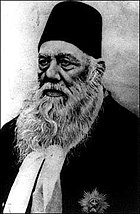Sir Syed
| Sir Syed Ahmed Khan | |
|---|---|

Sir Syed Ahmad Khan (1817–98)
|
|
| Born |
17 October 1817 Delhi, Mughal Empire |
| Died | 27 March 1898 (aged 80) Aligarh, British India |
| Nationality | British subject |
| Other names | Sir Syed |
| Alma mater |
Edinburgh University East India Company College |
| Notable work |
The Mohammadan Commentary on the Holy Bible Reasons for the Indian Revolt of 1857 |
| Awards |
|
| Era | 19th century |
| School | Islamic and Renaissance philosophy |
| Institutions |
East India Company Indian Judicial Branch Aligarh Muslim University Punjab University Government College University |
|
Main interests
|
Pragmatism, Metaphysics, language, aesthetics, and Islam and Christianity |
|
Notable ideas
|
Muslim adoption of Western ideas |
|
Influences
|
|
|
Influenced
|
|

The motto of Aligarh University, Taught man that which he knew not. (Qur'an 96:5)
|
Syed Ahmad bin Muttaqi Khan KCSI (Urdu: سید احمد خان; 17 October 1817 – 27 March 1898), commonly known as Sir Syed, was an Indian Muslim pragmatist,Islamic reformist and philosopher of nineteenth century British India. Born into a family with strong ties with Mughal court, Syed studied the Quran and sciences within the court and later studied law from the University of Edinburgh.
In 1838, Syed entered the service of East India Company and went on to become a judge at a Small Causes Court in 1867, and retired from service in 1876. During the Indian Rebellion of 1857, he remained loyal to the British Empire and was noted for his actions in saving European lives. After the rebellion, he penned the booklet The Causes of the Indian Mutiny – a daring critique, at the time, of British policies that he blamed for causing the revolt. Believing that the future of Muslims was threatened by the rigidity of their orthodox outlook, Sir Syed began promoting Western–style scientific education by founding modern schools and journals and organising Muslim entrepreneurs.
...
Wikipedia
